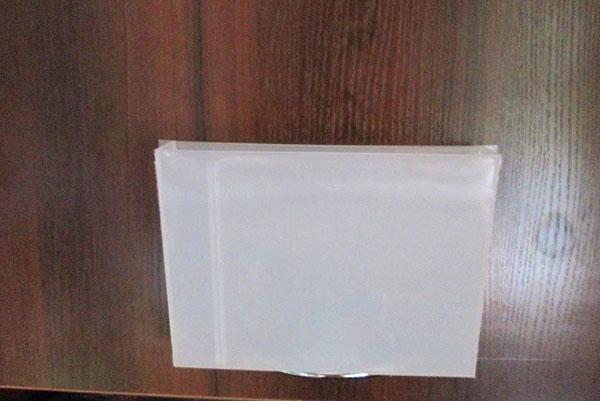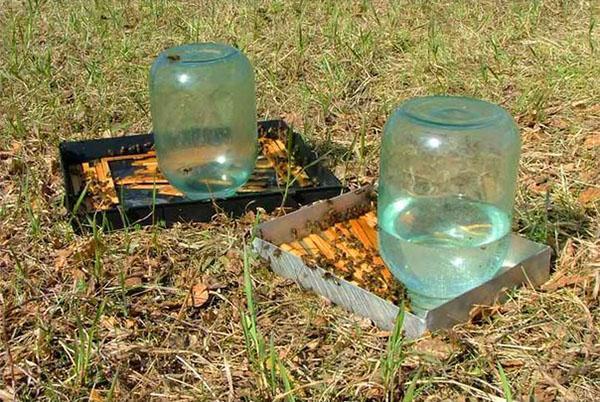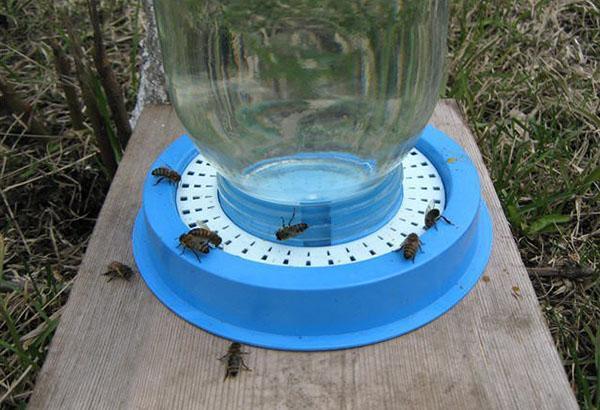Drinking bowl for bees and how to arrange it
 The arrangement of the apiary includes many seemingly insignificant elements. However, the bee drinker is also needed as a feeder. If in the summer a natural reservoir located nearby can help out, in winter and spring, the beekeeper is responsible for the supply of water to the hive.
The arrangement of the apiary includes many seemingly insignificant elements. However, the bee drinker is also needed as a feeder. If in the summer a natural reservoir located nearby can help out, in winter and spring, the beekeeper is responsible for the supply of water to the hive.
Basic requirements for a drinker

Drinking bowls for bees can be arranged for each hive and called individual, or be common for the apiary. Individual, family drinkers are used in small apiaries. The main condition is that by the time the hives are displayed, the drinkers must work, otherwise the bee will find a source of water in another place.
 Drinking bowls can be external and internal. Internal devices are devices placed in the hive so that it is possible to control the level and add water without disturbing the bees. An example of a do-it-yourself drinker for bees can be a video about Milenin's universal drinker:
Drinking bowls can be external and internal. Internal devices are devices placed in the hive so that it is possible to control the level and add water without disturbing the bees. An example of a do-it-yourself drinker for bees can be a video about Milenin's universal drinker:
DIY bee drinker designs
 In one day, a common drinker for 20 families uses about 50 liters of water. It is important to organize its submission in such a way as to fulfill all the conditions. An open place is chosen so that the sun maintains the temperature of the water during the day. From the wind, the drinking bowl for bees is fenced off with a screen and rises above the ground to a level above 70 cm.In order to create a thin mirror of water, various means are used:
In one day, a common drinker for 20 families uses about 50 liters of water. It is important to organize its submission in such a way as to fulfill all the conditions. An open place is chosen so that the sun maintains the temperature of the water during the day. From the wind, the drinking bowl for bees is fenced off with a screen and rises above the ground to a level above 70 cm.In order to create a thin mirror of water, various means are used:
- wooden corrugated flooring with a slope:
- flat, low capacity, where rafts are laid out on a thin layer of water;
- a wide flat container with water and moss on which the bees stand and drink;
- a fluffy clean cloth is used, thrown over a container of water, it holds a bee that drinks from the lake in the center.
 A wooden corrugated board with grooves about 10 cm wide, located with a slight slope in the pores, will retain moisture, creating a thin layer on a smooth surface, there will be enough water in the grooves. Setting the correct level and adjusting the flow is a resolvable issue.
A wooden corrugated board with grooves about 10 cm wide, located with a slight slope in the pores, will retain moisture, creating a thin layer on a smooth surface, there will be enough water in the grooves. Setting the correct level and adjusting the flow is a resolvable issue.
A water mirror can be created by lowering a raft of twigs into the container. Then the bees sit on the raft and drink from the basin-lake. Water can be supplied in an accessible, adjustable way from plastic bottles installed in the bracket. However, insects do not fly to every do-it-yourself drinker for bees. The beekeeper should create a comfortable drinking bowl that would be pleasant to his charges and be easy to maintain.
 Particular attention should be paid to the device of an intrahive drinker for bees in the winter. The best design is a vacuum drinker. Fill the drinker without opening the hive. It is possible to control the water level.
Particular attention should be paid to the device of an intrahive drinker for bees in the winter. The best design is a vacuum drinker. Fill the drinker without opening the hive. It is possible to control the water level.
DIY bee feeders
Arrangement of the apiary includes the presence of feeders. Feeding bees occurs in the hive, and feeding is associated with family concerns. Therefore, the beekeeper chooses a design in relation to the existing hives. Buy a ready-made bee feeder or make a device with your own hands, everyone decides for himself. But an experienced beekeeper knows his bees and will create special conveniences for them.From the many proposed designs, you need to choose one type, and study the drawings and step-by-step instructions.
Varieties of feeders
Feeders of complex design with verified dimensions made of wood are made for installation in a hive. Usually they use a ceiling feeder, which is installed under the pillow. Drawings of such devices are easy to find, and the beekeeping community is happy to share their findings. An example of a successful design of a do-it-yourself bee feeder can be a video:
The queen bee lives for 5 years. She mates with 17 drones over 2 days of flight and stores her sperm for fertilization using it sparingly. If a larva develops from an unfertilized egg, it will be a drone.
A plastic bottle feeder is often used. Plastic is easy to process. It is lightweight and transparent. It can be used to make ceiling and external feeders. Sometimes these same devices are used as drinkers. Ceiling fixtures are made from flat plastic bottles of dark color. They are installed in advance, so as not to disturb the bees and not let the cold into the hive. Light jars can also be used for external feeders. The feed is dosed into a chute attached to the hive. Through the transparent walls, you can see how the nutrition decreases.
Or maybe it is better to buy ready-made feeders, developed by designers, such as Cornflower or Frame feeder? Experienced beekeepers try to equip the apiary with their own hands and slowly make new adaptations for their nurses. This saves money, allows you to equip the apiary to your liking.